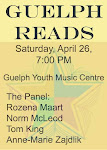Yann Martel, author of Life of Pi, is entering Year Two of a project that, in some ways, is rather similar, and in others, rather opposite.
After a lacklustre audience with the PM a year ago in celebration of the 50th anniversary of the Canada Council for the Arts, Martel decided to send Stephen Harper a book every two weeks.
A portion of how he explains his project: "Who is this man? What makes him tick? No doubt he is busy. No doubt he is deluded by that busyness. No doubt being Prime Minister fills his entire consideration and froths his sense of busied importance to the very brim. And no doubt he sounds and governs like one who cares little for the arts.
"But he must have moments of stillness. And so this is what I propose to do: not to educate—that would be arrogant, less than that—to make suggestions to his stillness."
Martel started with The Death of Ivan Ilych. Over the year, he's sent Candide, To Kill a Mockingbird and Le Petit Prince. Just today, he sent To The Lighthouse.He got one response, to Ivan Ilych. Since then, he's heard nothing. But he persists. It's his way of making social change, of trying to convince a busy man that he needs to slow down and appreciate life's stillness.
But in interesting ways, it's opposite to Guelph Reads. We're taking a group of people and asking them what book all their friends, family and neighbours should read. Martel is focusing on a single person, and asking him to browse an ever-growing reading list. Here's wishing him luck.
